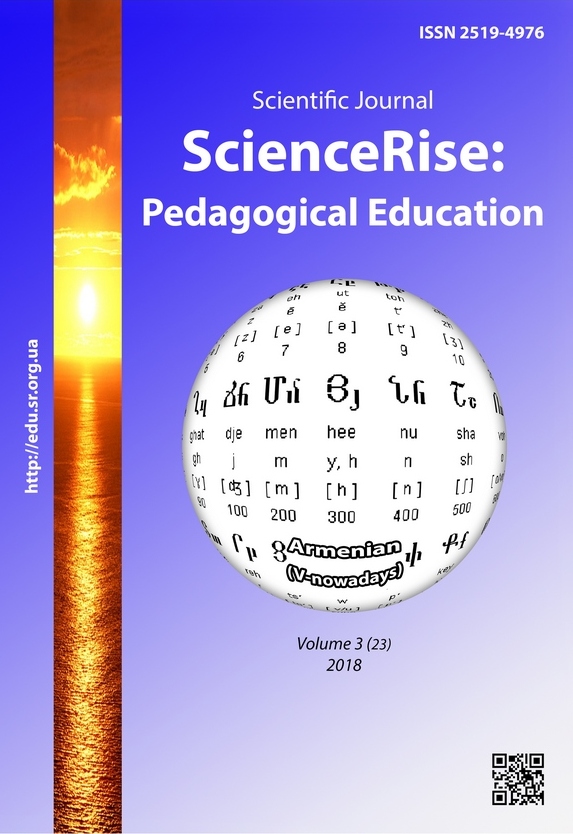Experimental verification of the effectiveness of the methodical system of formation of chemistry competence of future bachelors of the medical diagnostics and treatment technology at higher medical institutions of ukraine
DOI:
https://doi.org/10.15587/2519-4984.2018.127406Keywords:
experimental verification, methodical system, chemistry competence, bachelors, medical diagnosticsAbstract
The research presents the interpretations of the notions “chemistry competence of future bachelors of medical diagnostics and treatment technologies” and “program results of studying chemistry”. There were determined the formation criteria of chemistry competence of such specialists (“depth of professionally oriented knowledge”, “formation of professionally oriented abilities and skills in chemistry”, “motivation level of studying chemistry”, “mastering of professionally oriented personal qualities, necessary for conducting a chemical experiment”), their indices (correspondent coefficients) and levels (high, sufficient, primary). There were counted the research methods (questionnaire, testing, observation, filling forms of students’ self-estimation and so on). The effectiveness of the experimental methodical system was established by mean values of coefficients of formation of chemistry competence of students that exceeded the limit of 70 % and increment of these indices. Based on the calculation of the empirical value of t-criterion and its comparison with the table one, it was proved, that the level of chemistry competence formation of students increases, if to realize the educational process by the elaborated methodical system, directly oriented on achieving program results of studying chemistry by students
References
- Nikolaeva, I. M. (2017). Method of forming the chemical components of the professional competence of the future bachelor of laboratory diagnostics. ScienceRise: Pedagogical Education, 6 (14), 40–42. doi: 10.15587/2519-4984.2017.105522
- Birta, H. O., Burhu, Yu. H. (2014). Metodolohiia i orhanizatsiia naukovykh doslidzhen. Kyiv: Tsentr uchbovoi literatury, 142.
- Walliman, N. (2011). Research methods the basics. London-New York: Routledge, Taylor & Francis Group, 190.
- Hesse-Biber, S. (2015). The problems and prospects in the teaching of mixed methods research. International Journal of Social Research Methodology, 18 (5), 463–477. doi: 10.1080/13645579.2015.1062622
- Panasenko, E. (2011). Zmist i struktura eksperymentu yak metodu naukovoho doslidzhennia u teorii ta praktytsi vitchyznianoi pedahohiky (1945–1991 rr.). Ridna shkola, 11, 28–35.
- Horakova, T., Houska, M. (2014). On Improving the Experiment Methodology in Pedagogical Research. International Education Studies, 7 (9), 84–98. doi: 10.5539/ies.v7n9p84
- Avramenko, O. V. (Ed.) (2011). Vymiriuvannia v osviti. Kirovohrad: Lysenko V. F., 360.
- Pro osvitu. Zakon Ukrainy vid 05.09.2017. No. 2145-VIII (2017). Verkhovna Rada Ukrainy. Available at: http://zakon3.rada.gov.ua/laws/show/2145-19 Last accessed: 05.09.2017
- Hrabovyi, A. K. (2012). Teoretyko-metodychni zasady navchalnoho khimichnoho eksperymentu v zahalnoosvitnikh navchalnykh zakladakh. Cherkasy: ChNU imeni Bohdana Khmelnytskoho, 376.
- Tyshchenko, S. I., Volovyk, P. M. (2013). Metody teorii ymovirnosti i matematychnoi statystyky u pidhotovtsi maibutnoho vchytelia do naukovo-doslidnoi roboty. Mykolayiv, 240.
Downloads
Published
How to Cite
Issue
Section
License
Copyright (c) 2018 Iryna Nikolayeva

This work is licensed under a Creative Commons Attribution 4.0 International License.
Our journal abides by the Creative Commons CC BY copyright rights and permissions for open access journals.
Authors, who are published in this journal, agree to the following conditions:
1. The authors reserve the right to authorship of the work and pass the first publication right of this work to the journal under the terms of a Creative Commons CC BY, which allows others to freely distribute the published research with the obligatory reference to the authors of the original work and the first publication of the work in this journal.
2. The authors have the right to conclude separate supplement agreements that relate to non-exclusive work distribution in the form in which it has been published by the journal (for example, to upload the work to the online storage of the journal or publish it as part of a monograph), provided that the reference to the first publication of the work in this journal is included.








